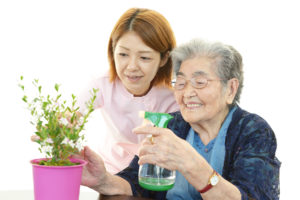Everyone feels the need to experience the natural world. Walks in a park and drives through the countryside are popular pastimes. But advancing age and limited mobility may deprive the elderly of quality time in the great outdoors, but that need not deactivate their green gene.
Homecare agencies and caregivers can suggest ways to awaken or rekindle a senior’s love of nature. How? One answer is houseplants.

Even those whose thumb isn’t dipped in chlorophyll can find easy-care, inexpensive plants at grocery stores and garden centers. Elders who no longer drive or shop for themselves can thumb through a garden magazine or click on a website and fall in love with a Chinese evergreen, Philodendron, or Asparagus fern. Family members and homecare providers can bring easy-care plants home to Mom every week with the groceries. A Yucca tree in a pretty pot can make the empty spot next to the patio doors bloom with life. A bowl of African violets atop a bedroom table can make waking up more delightful.
Worries that a senior’s lack of gardening expertise will drown their devil’s ivy or doom their spider plant to a withering death from dehydration are exaggerated. Department store plants are no shrinking violets. They tolerate neglect while providing cheerful reminders that even life inside a plastic container is worth celebrating.
Benefits of Having Houseplants
Visiting time can weigh heavily when an elderly parent or older friend is house bound. Plants provide an answer to the question of “what’s new?” Topics of conversation that extend beyond a senior’s medication, hygiene, exercise, and nutrition lighten the mood. And plants like spearmint or the Azores Jasmine can quite literally clear the air in a stuffy house while making visits with an older adult much more interesting.
Plus, intrigued by a neighbor’s hobby or a home caregiver’s special expertise greens the conversation. Curiosity about an oddly-shaped or exotic plant can encourage Uncle Andy to peck on his computer keyboard or ask Alexa to research his new friend’s homeland, leaf shape, and root structure. If Andy feels the urge to socialize, there are groups on social media for every possible interest. Gardening is a perennial favorite.
Keeping house plants happy and healthy is less demanding than caring for a pet, but it could become a source of wonder and pride for Aunt Carol, a widowed librarian who needs to her family to notice that despite her physical infirmities is alert, competent, and useful. House plants remind grandmothers to share their stories about girlhoods spent on family farms, tending livestock, weeding gardens, and canning tomatoes.
Speaking of tomatoes, yes, there are varieties that grow indoors. Older adults with gardening experience may know more about plants than their younger family members and homecare helpers. Giving elderly adults the opportunity to pass on their wisdom is one of their basic food groups, and that may be the care Mom and Dad need the most, someone to listen.
Low Light plants https://www.housebeautiful.com/lifestyle/gardening/g2628/low-light-houseplants/
Fragrant Indoor plants https://www.diynetwork.com/made-and-remade/learn-it/13-best-fragrant-indoor-plants
Air-cleaning plants https://dengarden.com/gardening/air-cleaning-houseplants-that-are-crazy-easy-maintain
30+ Gorgeous Indoor Plants That Are Almost Impossible to Kill
https://www.goodhousekeeping.com/home/gardening/advice/g1285/hard-to-kill-plants/
